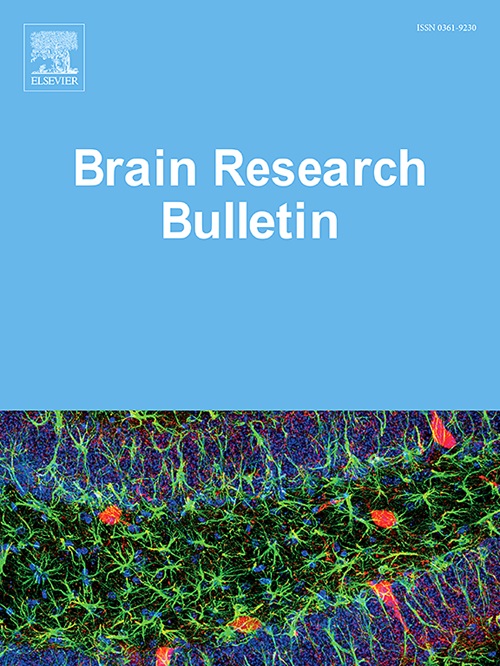复发性抑郁症易感性的潜在危险因素。
IF 3.5
3区 医学
Q2 NEUROSCIENCES
引用次数: 0
摘要
背景:重度抑郁症(MDD)是一种高度流行和复发的神经精神疾病,与BicC家族RNA结合蛋白1 (BICC1)的改变有关。然而,调控BICC1和影响复发性抑郁易感性的潜在危险因素尚不清楚。方法:首先检测首发或复发性抑郁症患者及其对照血清中热休克蛋白90 (HSP90)、缺氧诱导因子1- α (HIF1α)和BICC1的含量。然后,通过在小鼠中再次暴露于慢性不可预测的轻度应激(CUMS),评估复发性抑郁症的动物模型。分析HSP90、HIF1α、BICC1在大鼠前额皮质(PFC)中的表达情况。结果:我们发现抑郁症患者,尤其是复发性抑郁症患者血清中HSP90、HIF1α、BICC1明显升高,提示这些分子可能是抑郁症,尤其是抑郁症复发的特定致病危险因素。此外,复发性抑郁症小鼠模型还伴有前额皮质(PFC)中HSP90、HIF1α和BICC1的表达显著升高。结论:目前的研究发现HSP90、HIF1α和BICC1是影响复发性抑郁症易感性的新的潜在危险因素。本文章由计算机程序翻译,如有差异,请以英文原文为准。
Potential risk factors of susceptibility to recurrent depression
Background
Major depressive disorder (MDD) is a highly prevalent and recurrent neuropsychiatric disorder associated with alterations in the BicC family RNA binding protein 1 (BICC1). However, the potential risk factors that regulate BICC1 and affect susceptibility to recurrent depression remain unclear.
Methods
Herein, we firstly tested the heat shock protein 90 (HSP90), hypoxia-inducible factor 1-alpha (HIF1α), and BICC1 in the serum of the patients that were in first-episode or recurrent depression, as well as their controls. Then, through re-exposure to chronic unpredictable mild stress (CUMS) in mice, an animal model of recurrent depression was assessed. And the expression of HSP90, HIF1α, and BICC1 in the prefrontal cortex (PFC) were analyzed.
Results
We found that HSP90, HIF1α, and BICC1 were significantly increased in the serum of depressed patients, especially in those with recurrent depression, indicating that these molecules may serve as specific pathogenetic risk factors for depression, especially depression recurrence. In addition, the recurrent depression mice model was found to be accompanied by a significant increase in expression of HSP90, HIF1α and BICC1 in the PFC.
Conclusions
The current study identified HSP90, HIF1α, and BICC1 as novel potential risk factors that affect susceptibility to recurrent depression.
求助全文
通过发布文献求助,成功后即可免费获取论文全文。
去求助
来源期刊

Brain Research Bulletin
医学-神经科学
CiteScore
6.90
自引率
2.60%
发文量
253
审稿时长
67 days
期刊介绍:
The Brain Research Bulletin (BRB) aims to publish novel work that advances our knowledge of molecular and cellular mechanisms that underlie neural network properties associated with behavior, cognition and other brain functions during neurodevelopment and in the adult. Although clinical research is out of the Journal''s scope, the BRB also aims to publish translation research that provides insight into biological mechanisms and processes associated with neurodegeneration mechanisms, neurological diseases and neuropsychiatric disorders. The Journal is especially interested in research using novel methodologies, such as optogenetics, multielectrode array recordings and life imaging in wild-type and genetically-modified animal models, with the goal to advance our understanding of how neurons, glia and networks function in vivo.
 求助内容:
求助内容: 应助结果提醒方式:
应助结果提醒方式:


